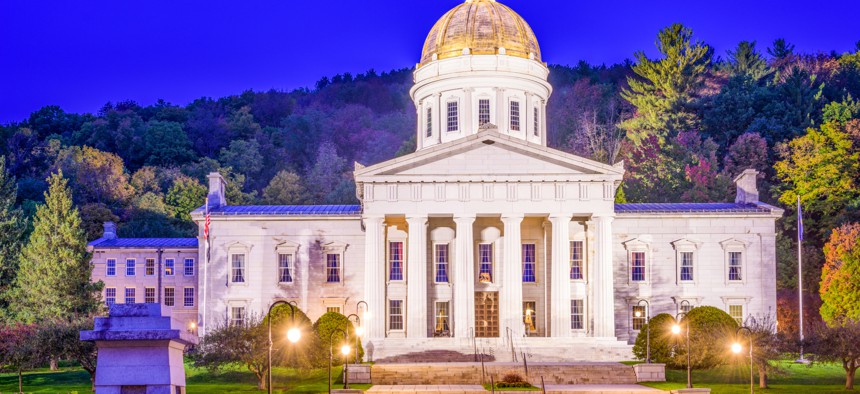Municipal Leaders Gather for Resilient Cities Summit

The Vermont State House in Montpelier, Vermont Shutterstock
Climate change presents complex and interwoven policy challenges for local governments, all of which will be front and center during discussions in Vermont.
STOWE, Vt. — Local government leaders from around the U.S. are gathering here this week to discuss ways to make cities less vulnerable to climate-related threats, such as flooding, severe storms, water scarcity and rising sea levels.
Those conversations will take place as part of the 2017 Resilient Cities Summit, held by the National League of Cities, the Urban Land Institute, and the U.S. Green Building Council. Project funding and financing will be a main area this year’s event will focus on.
“We always hear that cities, the number one issue for them, is the level of funding and trying to identify more resources for infrastructure,” said Cooper Martin, program director for the Sustainable Cities Institute at the National League of Cities.
“At the same time,” he added, “we’ve heard for several years now that there are institutional investors with money to invest and they’re really asking: ‘where are the projects?’”
Martin expects discussions at the summit to zero-in on this issue. “That just seems to be the crux,” he said, “getting to that point where cities know how to package deals, how to offer them in ways that the investors see that they’re out there and see the attractiveness.”
Mayor John Hollar, of Montpelier, Vermont, is among those who will be on hand at the event.
Montpelier, which is Vermont’s capital city, has roughy 7,500 residents and is located about 40 miles east of Burlington.
Hollar said in a phone interview that a key challenge for his city, from a resilience perspective, is the potential for flooding from heavy rainfall, or from river flows. Montpelier is situated among steep slopes at the confluence of two rivers—the North Branch and the Winooski.
When Tropical Storm Irene devastated parts of Vermont in 2011, the worst of the storm missed Montpelier. But the city has experienced severe floods, one in 1992 and another in the 1920s.
“We’re at significant risk here,” Hollar said.
Montpelier has developed a stormwater master plan and is looking at ways to better manage the runoff that flows off of impervious surfaces like blacktop parking lots and roofs, according to Hollar. But identifying options to pay for projects in a small city can be difficult.
“Stormwater funding, we’re dependent on state resources,” Hollar noted.
The mayor said he believes that opportunities for private investment to support infrastructure projects that would help address flooding risks in the city are probably limited.
But, he added, that does not necessarily mean the private sector does not have a roll when it comes to addressing resilience issues in the city.
“In terms of stormwater runoff,” the mayor said, “one of the biggest sources is rooftops and rooftops are largely for buildings that are owned privately. So we’re going to have to be working with these property owners to come up with the best solutions for that.”
This is the third year the Resilient Cities Summit will take place. In addition to local government officials, experts in community development, finance, and infrastructure are set to attend.
Resiliency issues that communities in the U.S. face tend to vary by region.
While stormwater management may be a priority in some northeast and midwest cities, parts of Florida are faced with challenges tied to sea-level rise and saltwater intrusion into drinking water supplies. And in western states drought and wildfires can pose risks.
Asked why he thought it was an important time for local government leaders to be participating in an event like the summit, Hollar pointed to the “alarming effects” of climate change.
He also highlighted President Trump’s recent decision to withdraw from the Paris accord—a landmark agreement between nearly 200 nations to take steps meant to reduce greenhouse gas emissions.
“That decision has made clear that leaders at the state and local level need to step up and exercise leadership on climate change,” Hollar said. “Because it’s clear for the next several years we’re not likely to see that from Washington, unfortunately.”
RELATED on Route Fifty:
Bill Lucia is a Senior Reporter with Government Executive’s Route Fifty and is based in Washington, D.C.
NEXT STORY: Local Governments Looking for Broadband Partners to Gather in Kansas City






